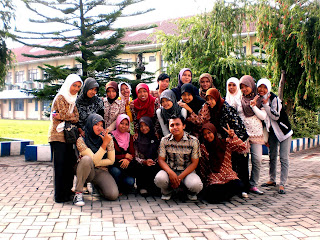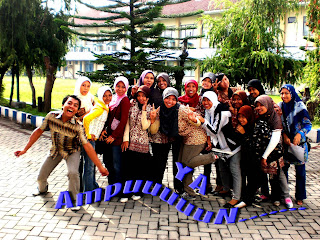Eight Sea Family
Posted by
2008 C English Department STKIP PGRI Jombang
komentar (0)
You can download Presentation file of profesi kependidikan from the third group, titled "Seputar Permasalahan Guru".
Click the link below:
download file
Click the link below:
download file
Posted by
2008 C English Department STKIP PGRI Jombang
komentar (0)
Today, Saturday 24 April 2010, A
great event celebrated in our campus, namely Graduation Ceremony (Wisuda) for
the Students of the Academic Year 2006. This agenda is held in the mid field of
STKIP PGRI jombang. Hundreds candidates of teacher have been graduated. Will
they all become teacher? Are education institutions in Jombang enough to
receive them all? How many teachers are needed?
We are as the junior, who will be
like them, should take experience, learn from the event, take messages, and
think more about our future. Are you ready to compete with others? Have you
prepare it all?
There are many things we can learn
from the event. First, time is running so fast that college teaching learning process
is just like a dream. The time is too short when we try to compare with the
science, knowledge and everything that we must learn. There are still many things
we haven’t known. We must learn more and more. We should use our time well. This
is for our future and of course for Indonesian young generation future.
Second, Life is competition. Whenever and wherever
we are, since we are still alive in this world, we will compete.
Label:
News
Posted by
2008 C English Department STKIP PGRI Jombang
komentar (0)
- Buka blogger.com - log in
- Buka 4shared - log in
- Upload file ke 4shared
- Setelah upload selesai, klik file yang telah di upload, nanti akan mucul link.
- Copy link tersebut
- buka kembali dasbor blog - posting baru - paste link di tautan (klik tulisan "link" yang ada di tab posting)
- terbitkan entri
Posted by
2008 C English Department STKIP PGRI Jombang
komentar (1)
You have no time to type...? Here you are what you need. Just copy and paste, but do by yourself..
Good Luck, guys.....!!!
PARAPHRASE
1. Artificial Languages
Since
the time of Descartes, it is estimated that no fewer than five hundred attempts
have been made to create artificial languages for international use. The most
successful by far has been Esperanto, a language constructed around the end of
the nineteenth century by Dr. Zamenhof of Poland. Esperanto is a language that
is extremely easy to learn and speak, with its words drawn mainly from English,
German, the Romance languages, Latin and Greek.
A
more recent arrival on the international scene is Interlingua, scientifically
constructed by a group of language experts out of Latin, the Romance languages
and English. But whereas Esperanto has a large body of people who actually
speak it scattered throughout the world, Interlingua has not yet achieved much
popularity (Pei 175 – 176)
2. Artificial Languages - Objections
The main objection to constructed languages, like
Esperanto of Interlingua, is that they have not developed all the
thought-carrying machinery and shades of meaning that natural languages have
had a chance to work out for themselves over a period of many centuries; also,
the artificial languages presented so far lean too heavily in the direction of
the western European and American nations, and carry to little in the way of
Slavic, Asiatic, and African words and habits of thought (Pei 176)
3. Americans
Despite its
ethnic diversity, the United States has managed to absorb bits and pieces of
many cultures and weave them into a unique culture that is strikingly
consistent and distinct. You can pick out Americans anyplace in the world,
often very quickly, because of their behavior. Among their most observable
traits are openness, friendliness, informality, optimism, creativity, loudness,
and vitality (Hall and Hall 140)
4. The Work Ethic of Americans and Europeans
Europeans
often observe that Americans schedule everything except time for relaxation.
This is particularly true of American executives, who drive themselves hard,
often at the expense of their families and their health. Americans have fewer
holidays and take shorter vacations than do Europeans. In the opinion of many
German and French executives, American executives are obsessed with work;
they’re workaholics. Most Europeans do not accept working on weekends or
holidays; they reserve these times for themselves and their families (Hall in
Hall 145).
SUMMARY
A Less
Social Society Becoming Shy
Growing
number of those people standing silently in line at the automatic teller
machine (ATM) or pumping their own self-service gas are probably victims of
America’s silent, anonymous epidemic. They are shy-and the rapid technological
and social changes rippling through America are increasing their numbers
rapidly, says the world’s pioneering researcher into shyness… the increasing
numbers of shy people mean Americans are lonelier, more alienated, and in worse
shape, both mentally and physically. That is hardly a prescription for a
healthy society. (Epstein A1)
Stanford
university professor Philip G. Zimbardo places the blame for the rising tide of
shyness on three factors. First,
automation, as exemplified by ATMs and self-service gas pumps that take credit
cards, “robs many of us of one more small opportunity for social contact.”
Second, the revolution in personal computers and home electronic entertainment
means couch potatoes and cyber-surfers have less reason for social interaction.
“E-mail means you don’t have to talk to people, even over the telephone,”
Zimbardo commented. Third, the changing nature of family life and rising fear
of crime are shutting people off from each other. “You don’t see kids in the
streets anymore. All play is organized for them, so they don’t develop the give-and –take and the leadership skills
of the play ground,” he warned. With some 50 percent of marriages ending in
divorce and with most parents working, children are robbed of the nurturing
communication they once enjoyed with their parents and extended families. (qtd.
In Epstein A10)
Label:
Writing 3





























































.jpgm.jpg)
.jpgm.jpg)
.jpgM.jpg)
.jpgm.jpg)
.jpgm.jpg)
.jpgm.jpg)
.jpgm.jpg)
.jpgm.jpg)
.jpgm.jpg)
.jpgm.jpg)
.jpga.jpgm.jpg)
.jpgm.jpg)
.jpgm.jpg)
.jpgm.jpg)
.jpgm.jpg)
.jpgm.jpg)
.jpgm.jpg)
.jpgm.jpg)
.jpgm.jpg)
.jpgm.jpg)
.jpgm.jpg)
.jpgm.jpg)
.jpgm.jpgm.jpg)
.jpgm.jpg)
.jpgm.jpg)
.jpgm.jpg)
.jpgm.jpg)
.jpgm.jpg)
.jpgm.jpg)
.jpgm.jpg)
.jpgm.jpg)
.jpgm.jpg)
.jpgM.jpg)
.jpgm.jpg)
